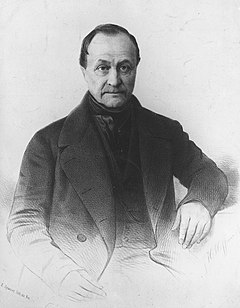
Back Positivismus ALS وضعية Arabic Positivismu AST Pozitivizm AZ Пазітывізм BE Позитивизъм Bulgarian Soliadouriezh BR Pozitivizam BS Positivisme Catalan Pozitivismus Czech

Positivism is a philosophical school that holds that all genuine knowledge is either true by definition or positive—meaning a posteriori facts derived by reason and logic from sensory experience.[1][2] Other ways of knowing, such as intuition, introspection, or religious faith, are rejected or considered meaningless.
Although the positivist approach has been a recurrent theme in the history of western thought, modern positivism was first articulated in the early 19th century by Auguste Comte.[3][4] His school of sociological positivism holds that society, like the physical world, operates according to general laws.[5] After Comte, positivist schools arose in logic, psychology, economics, historiography, and other fields of thought. Generally, positivists attempted to introduce scientific methods to their respective fields. Since the turn of the 20th century, positivism although still popular, has declined under criticism in parts of social sciences from antipositivists and critical theorists, among others, for its alleged scientism, reductionism, overgeneralizations, and methodological limitations.
- ^ John J. Macionis, Linda M. Gerber, Sociology, Seventh Canadian Edition, Pearson Canada
- ^ Larrain, Jorge (1979). The Concept of Ideology. London: Hutchinson. p. 197.
one of the features of positivism is precisely its postulate that scientific knowledge is the paradigm of valid knowledge, a postulate that indeed is never proved nor intended to be proved.
- ^ Cohen, Louis; Maldonado, Antonio (2007). "Research Methods In Education". British Journal of Educational Studies. 55 (4): 9. doi:10.1111/j.1467-8527.2007.00388_4.x. S2CID 143761151..
- ^ "Auguste Comte". Sociology Guide. Archived from the original on 7 September 2008. Retrieved 2 October 2008.
- ^ Macionis, John J. (2012). Sociology 14th Edition. Boston: Pearson. p. 11. ISBN 978-0-205-11671-3.